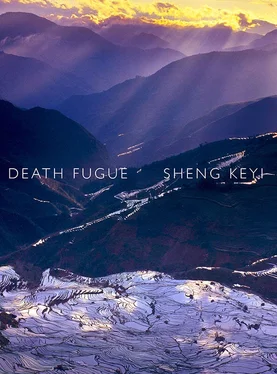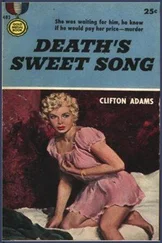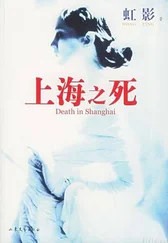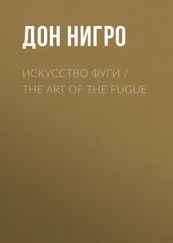‘Shanlai, did you go to see the peonies?’ Esteban asked.
‘Yes, the peonies have really opened up now. Those fellows are really plump,’ Shanlai answered.
Before long, Mengliu came across ‘those fellows’ that Shanlai had mentioned. There were worms on the peonies. The ‘peony silkworms’ were Esteban’s innovation, the result of a breeding method he had discovered. Their silk was very strong, able to withstand fire, radiation, even bullets. It was lightweight and warm. And it retained the smell of the peonies themselves.
It was hard to believe that Esteban could be credited with this discovery, but such a thing should not have been surprising in Swan Valley. There was no distinction between farmers and intellectuals here. Every farmer was himself an intellectual, and every intellectual was also a farmer or a craftsman. Everyone was a manual labourer and a thinker. Occupational discrimination did not exist. Everyone was equal. They advocated learning, and focused on nurturing a comprehensive sort of intelligence. One didn’t just become an expert in nails and screws, or understand a specialised, one-dimensional field of knowledge, while remaining an idiot in all other fields. In Swan Valley, there was no monopoly on a profession or authority. They had none of that so-called authority crap, where everyone had to listen like a fool, and take notes, without the ability to doubt or object.
The bulletproof peony silk made Mengliu think of artillery. The peony silkworms were manufacturing munitions for the citizens of Swan Valley. There was no need to pay them a salary or provide them with benefits or accommodation. There was no risk of these workers engaging in processions, protests, strikes, or violating law and discipline. The life of the silkworm ended when it stopped creating silk. From birth to death, they were the most law-abiding citizens in the world. He thought of Dayang’s vast area and abundant resources, with so much land available to cultivate not just peonies, but chrysanthemums, peach blossoms, pear blossoms, lilies…assuming everyone wore silk made from worms living on these flowers, thin as the wings of a cockroach, they would all be invulnerable, and their personal safety, and their quality of life, greatly improved. They would even have time to spend researching the use of Chinese herbal medicines to feed the silkworms, and then who could say what sorts of cures they might come up with for all manner of diseases. It would drop a bomb on the medical profession. They could apply for a scientific patent for the findings. A Nobel Prize would be given, and a legacy would be born.
The two men made their way out of the orchard and across a terraced field where some girls were picking tea.
They were still wary of one another. They had nothing in common to talk about.
Women’s voices raised in song wafted over to them. The bright clean voices melted the clouds and dispersed the mist.
‘I’m sorry. We’ve missed the planting ceremony. They’ve already started,’ Esteban said.
Girls dressed in red and green were lined up in rows across a paddy field, singing as they planted. Their hands rose and fell, quick and smooth, with a steady whooshing rhythm. The splashing produced a metallic sound.
Esteban said, ‘Rice isn’t the main crop. In Swan Valley planting is a leisure activity — please note that, it is for leisure. These ‘farmers’ are teachers, musicians, songwriters…They’re not the sort of farmers who toil with their faces to the earth and backs to the sky. You can enjoy beauty and art in their labour, and in their happy lives. It’s not just toil, and they are neither poor nor ignorant.’
Dayang had a lot of people who spent their lives being neither warm nor well-fed. They were only half alive. They had no money, and even when they died, they had to pay out of their arses to clear their debts. The demarcation between rural and urban brought with it discrimination, prejudice, injury, and all sorts of harmful consequences. All of these were compressed, hidden in the silent spaces of individual fate.
Reclining against a mound of earth and chewing on a stalk of grass, Mengliu asked the raccoon, ‘Shanlai, what grass does the lion eat? I hear that the grass lions chew on has healing properties.’
The little creature had grabbed a handful of clay and was sculpting a portrait of someone. It looked a little like Esteban’s silhouette. He answered, ‘It’s hard to say what kind of grass lions like. There are lots of different kinds of grass in Swan Valley — Kentucky bluegrass, tall fescue, perennial ryegrass, Bermuda grass, bent grass, white clover, red clover, weeping lovegrass, Bahia grass, creeping dichondra…some kinds of grass don’t even have names. The lion has to nibble on hundreds of them, and maybe the miraculous healing power comes from the mixture.’ The creature paused, then went on, ‘You’re a doctor. You should learn from the legendary farmer god, testing hundreds of types of grass to find a way to cure sick people. If you keep thinking about reaping without sowing, you’ll just be a good-for-nothing.’
Mengliu spat out the grass. ‘That would be going back to barbarism. If all the good doctors went up into the mountains and started trying herbs together, then all that sick people could do would be to sit and wait for death. Moreover, hospitals have set procedures and a certain mode of operation. A single person can’t be picking herbs and handling pharmaceuticals, as well as seeing patients and performing surgery…That’s not practical.’
‘What I’m talking about is the spirit of the legendary farmer god. The spirit, you understand?’ The boy finished sculpting the nose, picked up his work, and took a closer look, as if lecturing the face he had created. ‘What you lack is “spirit.” You can’t even discover the vast majority of illnesses, and when you discover an illness, you can’t find a cure. For the illnesses you can cure, the patient has to wait a long time for you to treat them. With difficulty, he finally takes a number, then when he gets to see you at last, you don’t even take the pains to cure him. Sometimes the cure comes just because the patient has endured the disease and let it run its course so the body can heal itself. But when the patient recovers, you get the credit for curing him. When they die, well, you’ve done your best. So it seems like doctors don’t do anything.’
The public cafeteria was housed in a stand-alone building surrounded by a grey stone wall covered with carvings of animal figures, water buffaloes, dogs, birds, and goldfish. The door was propped open, and the windows had coloured wax drawings on their panes. The cafeteria wasn’t large, and had timber walls, floors, tables and chairs. The atmosphere was rustic and warm.
A stream of people wandered in and took their seats. Some poured rice wine from a large jug into smaller jugs, cups or bowls. When the food was served, there were buckwheat cakes, corn on the cob, cubes of jellied blood, sour fish soup, bacon, fruit salad, salmon, sushi, and rice dishes. Mengliu had learned the names for many of the dishes. He liked the buckwheat cakes and salmon. He had been hungry for some time, and he eagerly took up his chopsticks and was about to pick at the dishes. But no one else had moved to do the same. As it turned out, there was a ceremony to be observed before the meal.
A man who looked like a pastor took a small book from his breast pocket. His beard quivered as he cleared his throat, and began reading from his bible.
A young man beside Mengliu started playing a flute. It was a sparkling melody that brought to mind harvest festivities. The atmosphere was relaxed but dignified, and everyone spoke lightly as they ate. They were gentle and polite, and the sound of chopsticks striking against bowls was seldom heard. Some used a fork and knife. They conversed in Swanese, sometimes mixing in a bit of Chinese, such as the words for ‘soul’ and ‘reincarnation’ and the like. Their laughter too was typical of Swanese, used sparingly, with their merriment more evident in their soundless smiles. Occasionally there was a monosyllabic utterance, such as ‘eh’, ‘huh’, or ‘hey’. There were dozens of diners, but it wasn’t noisy or disorderly. Unlike Beiping, where restaurants were always full of a wanton clamour, everyone here ate and behaved moderately, with movements as careful as if they were meant for feeding a baby.
Читать дальше












